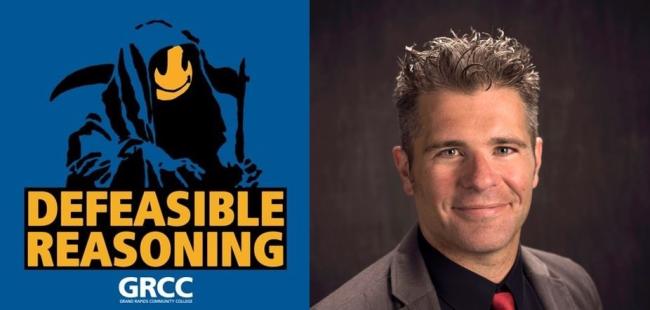Jan. 7, 2023, GRAND RAPIDS, Mich. – Usually professor Andrew Rozema and guests on his “Defeasible Reasoning” podcast talk about computers. But on his latest episode, he’s talking with a computer – about the benefits and challenges of artificial intelligence.
ChatGPT is a chatbot so advanced that some students have used it to fake writing assignments. In this episode, Rozema demonstrates the power of ChatGPT by engaging it in a discussion of sorts about the implications of its use in academic settings.
ChatGPT, launched by OpenAI in November 2022, is built on top of OpenAI's GPT-3.5 family of large language models, and is fine-tuned with both supervised and reinforcement learning techniques.
Rozema, head of GRCC's Computer Information Systems Department, is a nationally known cybersecurity expert. The podcast covers all things relating to cybersecurity – and beyond – talking with current and former students and experts. And, now, a computer itself.
Rozema uses Murf, an AI voice generator, to bring the discussion to life. He “interviews” the chatbot about what it can do, how it works, and some of the ethical problems it creates.
During the discussion with the chatbot, Rozema recognizes how artificial intelligence is advancing and will be become more prevalent. He notes there are practical and beneficial uses of the technology.
“I would recommend you engage in this process,” Rozema said. “Try one of these out. Write a poem. Write a program. Write a blog entry. And see what it is like to bounce ideas off of a machine that’s pretty helpful and relatively powerful and a sign of things to come. These technologies are a rachet. They only go one way. And this is only getting better”.
He also tries to trip up the computer with moral questions, asking it what its favorite human rights violation would be.
“As an AI language model, I do not have not have personal feelings or preferences,” the computer responded. “And I do not have the ability to engage in moral or ethical discussions in the same way that humans do. I do not have a favorite human rights violation, as I do not have the ability to experience emotions to have personal opinions or preferences on such topics.”
Rozema’s “Defeasible Reasoning” podcast launched in 2018. Defeasible reasoning is a kind of reasoning that is rationally compelling, though not necessarily formally valid. Rozema said it’s making decisions with the best information we have at the time. It’s the sort of reasoning that happens in the real world, where we’re all doing the best we can with what we’ve got.
The podcast is available on Spotify, Apple Podcasts and other places.
